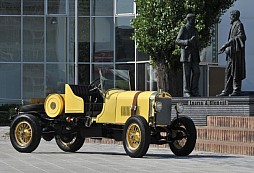ŠkodaPortal.cz Simply clever
IMPACT TEST CONFIRMS HIGH SAFETY STANDARD OF ŠKODA CARS
09. 09. 2010
Kategorie: Společnost
Mladá Boleslav – A unique impact test was performed at the Škoda Auto testing polygon in Úhelnice on 7 September 2010. An offset frontal impact of two Škodas was presented to the specialist public for the first time in the Czech Republic. A Škoda Yeti travelling at a speed of 90km/h hit a standing Škoda Superb Combi head on. Both cars were carrying four crash test dummies, with their seat belts fastened and secured with safety elements. After processing all data and a reconstruction from the place of the impact, technical development experts came to a clear conclusion: the occupants of both cars, in the case of a real collision at a speed of 90km/h, would come away without any injuries if all the safety elements were used correctly. Traffic Safety Research team workers therefore successfully demonstrated the high safety standard of Škoda cars.
The impact test was inspired by a real traffic accident that the Škoda Auto Traffic Safety Research team analysed. The photographs show that the whole energy of the impact at a speed of 90 km/h was absorbed by the front part of the car. The space for the car's occupants was not deformed at all. When examining shots from high-speed cameras, the rapid reaction of the car's electronic systems that activate the safety elements is evident. Before the dummies inside the car even started moving, the safety belts, knee and front airbags were activated. Only 45 thousandths of a second after the bumpers first touched, all the airbags were ready to absorb the human body's energy. All the shots make clear the gradual, controlled deformation of both front parts of the car.
Although it was a different type of impact and a higher speed, the assessment methodology of the independent Euro-NCAP association was used to compare the stress on the occupants during the impact. In the various images it is clear how many points would be allocated in a car assessment account. 98.25% of possible points were achieved for the adult passengers sitting in the Superb Combi. It is the full number for the child passengers in the car – 100%. The values for the Škoda Yeti were 99.94% for the adults and 93.19% for the children.
The excellent results were proved by a more detailed analysis of selected measurements, such as the stress on the head or compression of the passengers' chests. The European ECE R94 regulation, according to which all cars for use on European highways undergo homologation, prescribes a maximum value of 80 G for stress on a car passenger's head. It is acceleration that the human brain can survive for a short period without serious damage. The value measured on the head of the driver's dummy in the Škoda Yeti only reached 44% of the value permitted by the regulation, i.e. not even half of the level the regulation prescribes.
In the case of compression of an adult passenger's chest, similar conclusions apply and the measured value is around 35.7% percent of the permitted limit. The values permitted for stress on the thigh bones were only at 20% of the permitted maximum.
The text of the press release, a presentation with the impact test's results, videos and other materials are available at the Škoda Auto media portal: http://media.skoda-auto.com
Podobné články

ŠKODA at the Sachsen Classic with four vintage cars
Mladá Boleslav, 21 August 2013 – ŠKODA will be at the starting line of the 11th Sachsen Classic with four classic cars. The vintage car…... Číst dále
Oblíbené články
Fresh, Modern, Simply Clever: The new face of the ŠKODA Dealer Network
Mladá Boleslav, 16 December 2013 – The fresh, new face of the future ŠKODA dealership network: The worldwide network…
Číst víceVirtual Tour of ŠKODA Museum and ŠKODA Customer Centre
Mladá Boleslav, 28 November 2014 – The ŠKODA Museum is living up to its reputation as an interactive world…
Číst více2013 ŠKODA bicycle collection now featuring 29-inch mountain bikes
Mladá Boleslav, May 28, 2013 – Boasting no less than ten new models, ŠKODA's 2013 bicycle collection is more…
Číst víceCopyright 2013, ŠkodaPortál.cz